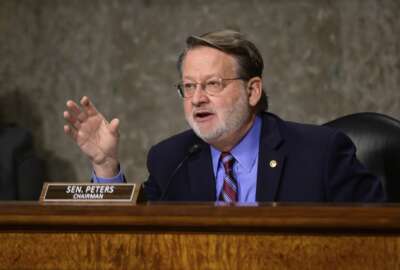Senators want to eliminate any conflicts of interest with government contractors
In today's Federal Newscast, a bi-partisan group of Senators are taking aim at organizational conflicts of interest among federal contractors.
To listen to the Federal Newscast on your phone or mobile device, subscribe in PodcastOne or Apple Podcasts. The best listening experience on desktop can be found using Chrome, Firefox or Safari.
- A bipartisan group of senators are taking aim at organizational conflicts of interest among federal contractors. Sens. Gary Peters (D-Mich.), Maggie Hassan (D-N.H.), Joni Ernst (R-Iowa) and Charles Grassley (R-Iowa) introduced the Preventing Organizational Conflicts of Interest in Federal Acquisition Act yesterday. The bill would require contractors to disclose other business relationships with entities that conflict with the work that an agency has hired them to do. Agencies also would have to update their policies for determining whether vendors have a potential conflict of interest.
- For federal employees, the White House’s 2023 budget request is more than just their pay raise. The Biden administration is asking for a 4.6% pay raise for federal employees and military service members in fiscal 2023. But more than just the number, the White House is using the budget request to convince Congress why this raise is more than necessary and deserved. The administration said on average private sector pay increased by 38% between 2009 and 2020, while federal worker salaries went up by a total of 15%. The White House also said increasing pay and addressing other HR challenges like time to hire is necessary to keep agencies competitive, especially when hiring skillsets which are in short supply like cybersecurity and nurses. (Federal News Network)
- Federal agencies are looking to hire more interns in 2023. Under the White House’s 2023 budget request, the departments of Commerce, Justice, Labor, State and more plan to hire a combined total of 35,000 interns next year. The White House said it’s planning to make more of those internships paid opportunities. The Office of Personnel Management will also work to break down barriers to more diverse intern hiring. Increasing internships is part of the administration’s larger goal of recruiting and retaining a high-quality federal workforce.
- The White House wants to use Federal Executive Boards to get more people from underserved communities to join the federal workforce. Through FEBs, agencies can lean on local connections to recruit from more diverse talent pools. To help the FEBs do that, the 2023 budget request updates the program’s funding and governance structure, which is more than 60 years old. The budget request also establishes a program management office for the FEB community and provides a Line of Business funded at $10 million. These changes support the President’s Management Agenda’s priority of strengthening the federal workforce.
- The Biden administration brought back a plan to move the FBI headquarters out of Washington, D.C. The White House is calling on the FBI to move its headquarters to suburban Maryland or Virginia as part of its budget request for fiscal 2023. The request gives the General Services Administration and FBI a year to decide where it will construct a new facility that will hold at least 7,500 employees. The bureau wouldn’t fully withdraw from D.C. The budget calls for the General Services Administration and the FBI to find a federal building in D.C. that can accommodate up to 1,000 FBI employees. These employees would stay in D.C. to handle day-to-day communication with the Justice Department, White House and Congress. (Federal News Network)
- Many agencies would get a cybersecurity boost under the White House’s latest budget request. The Biden administration is seeking $10.9 billion in cybersecurity spending at civilian agencies in fiscal year 2023. That’s about $1 billion more than last year. The request includes increased funding to adopt zero trust architectures at agencies like the Treasury Department. The White House budget also includes $2.5 billion for the Cybersecurity and Infrastructure Security Agency. The administration is looking to increase CISA’s staff by several hundred employees in 2023. (Federal News Network)
- The Biden administration is looking to give the Postal Service $5 billion to support its mail-in voting operations over the next decade. The While House, as part of its budget request for fiscal 2023, said these funds would increase USPS delivery capacity in underserved areas, would make ballots postage-free and reduce the cost of other election-related mail. The administration also proposes $10 billion in additional funding over the next decade to help state and local election officials make critical capital investments, as well as increase staffing. (Federal News Network)
- The Defense Department said it is finished with its new National Defense Strategy and has sent a classified version to Congress. The strategy sets the pace for the United States’ future military plans. The plan identifies four priorities including deterring Russia, assuring NATO allies, stopping attacks on the homeland and building a joint force. An unclassified version of the strategy will be released to the public soon.
- The Defense Department is looking to the future in its 2023 budget. The Pentagon is asking for $773 billion in its 2023 budget. The request accounts for a 4% increase from what Congress enacted for 2022 and a 2.2% increase when adjusted for inflation. Under the plan service members would see a 4.6% pay raise. The budget focuses on future capabilities to deter China. It proposes the largest research and development budget ever at one hundred and $30 billion. That money would go toward investments in artificial intelligence, 5G and other advancements. (Federal News Network)
- The National Archives plans to digitize 500 million pages of records and make them available online over the next five years. That’s one of the goals under the National Archives and Records Administration’s new strategic plan. NARA also plans to improve records access for underserved communities. The agency’s strategy also involves improving customer experience by developing a more systematic approach to collect and analyze feedback.
Copyright © 2024 Federal News Network. All rights reserved. This website is not intended for users located within the European Economic Area.
Eric White
Eric White is news anchor and Federal Drive producer at Federal News Network.
Follow @FEDERALNEWSCAST
Related Stories
Senators want to eliminate any conflicts of interest with government contractors
Related Topics
Acquisition
Acquisition Policy
All News
Biden administration
Chuck Grassley
Congress
Contracting
defense spending
digital records
diversity equity inclusion and accessibility
election
ethics
ethics guidance
FBI
FBI headquarters
Federal Drive
federal interns
Federal Newscast
federal pay raise
Gary Peters
Joni Ernst
Maggie Hassan
Management
National Archives and Records Administration
Postal Service
Preventing Organizational Conflicts of Interest in Federal Acquisition Act
Records management
Tom Temin
voting infrastructure
Workforce
Workforce Rights/Governance
zero trust






